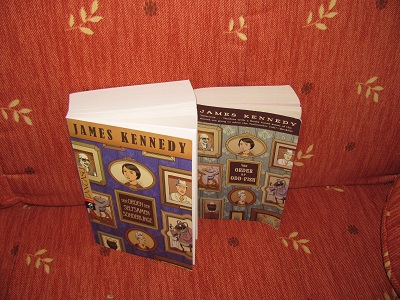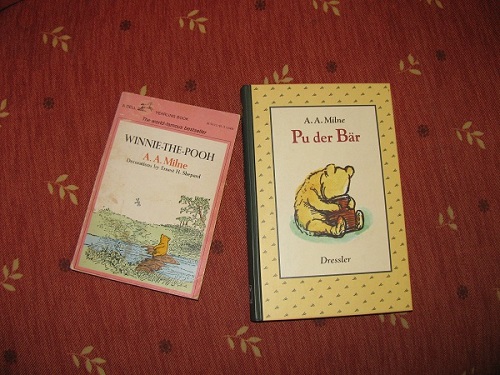Sonderling Sunday – Seltsamen Sonderlinge – The Return of the Belgian Prankster!
It’s time for Sonderling Sunday! That time of the week when I play with language by looking at the German translation of children’s books.
Tonight it’s back to the especially Sonder-book, Der Orden der Seltsamen Sonderlinge, which is the translation of The Order of Odd-fish, by James Kennedy.
Last time, we finished Chapter 23! So now it’s on to Chapter Twenty-Four! [This is out of 28 chapters. My Sonderling Sunday posts are becoming less and less frequent. This is mostly because I’ve become part of a group that plays games on Sunday afternoon. And I just like the sound of “Sonderling Sunday” too much to switch to another day. Theoretically, as the year 2018 progresses, I should spend less time posting and more time reading. So we shall see what happens. But anyway, tonight the gaming hosts are getting home from a holiday weekend with family, so here I am ready to translate!]
The first sentence of Chapter 24 is a perfect sentence for translating. I’m sure you want to know how to say this, should you ever be in Germany!
“The return of the Belgian Prankster sparked a citywide panic.”
= Die Rückkehr des Belgischen Scherzkekses löste in der ganzen Stadt einen wahren Tumult aus.
“breathless and exhausted” = atemlos und erschöpft
“flurry of chaos” = Chaos der Verwirrung
“still others sat numbly on the sidewalk”
= wieder andere saßen wie betäubt auf dem Bürgersteig
It amuses me how much longer this is in German:
“Everybody had the same panicked expression.”
= Die Menschen dort trugen alle denselben panikerfüllten Gesichtsausdruck zur Schau.
“jittery conversations” = nervösen Gesprächen
“headlines” = Schlagzeile (“strike-row”)
“baffling” = verblüffende
“No one dared venture near.”
= Niemand wagte es auch nur, in seine Nähe zu kommen.
(“No one dared it even, in his neighborhood to come.”)
“stern chiding” = scharfe Rüffel
“public ridicule” = öffentlichen Gespött
“poked him” = piksten ihn
This is a great sentence:
“People will put up with being terrified, but no one will tolerate being bored.”
= Die Menschen ertragen es, in Angst und Schrecken zu leben, aber keiner nimmt es hin, gelangweilt zu werden.
“Asylum for the Feeble of Brain” = Asyl für die Geistesschwachen
“Jo drank coffee after coffee”
= Jo trank unablässig Kaffee
(“Jo drank ceaselessly coffee”)
“suicide” = selbstmörderisch
“sticky and sluggish” = stickig und zäh
“Nothing seemed worth doing.”
= Nichts schien der Anstrengung wert zu sein.
“eyes ache” = Augen wehtaten
“writhed” = wälzte
“feeling like she was wrapped in hot wet cotton”
= hatte das Gefühl, sie wäre in heiße, nasse Baumwolllaken eingewickelt
The last sentence of the section about the Belgian Prankster:
“Furious but repulsed, fascinated but terrified, she felt herself pulled toward him.”
Sie war wütend und angewidert, fasziniert und verängstigt und fühlte sich trotz allem zu ihm hingezogen.
Here’s hoping you never have occasion to use that sentence!
That’s all for tonight! Until next time, may you not be terrified or bored!




